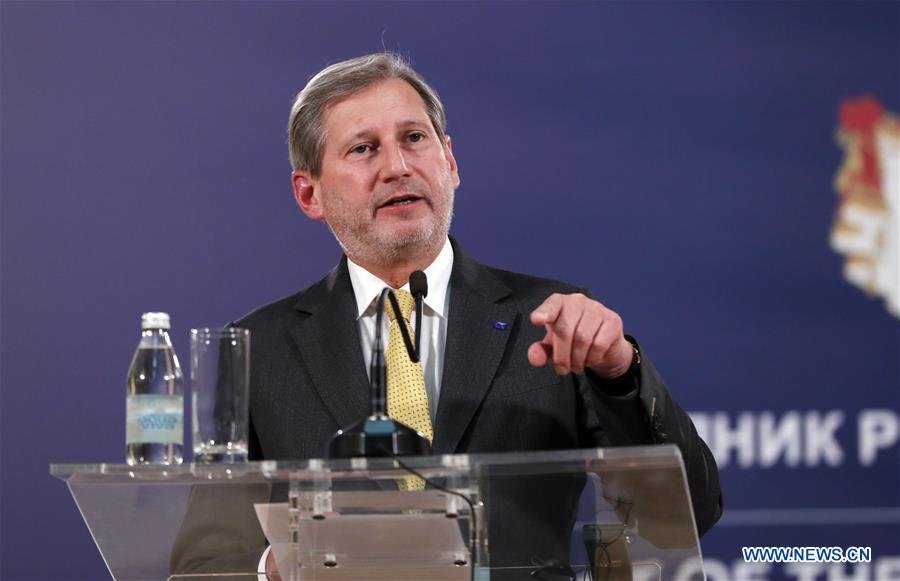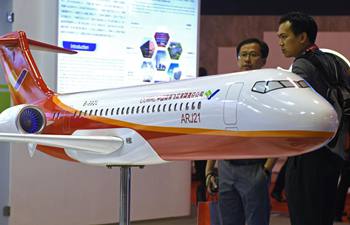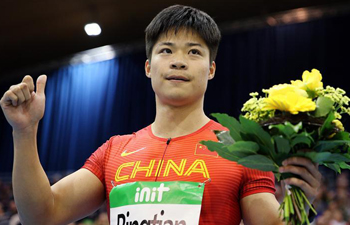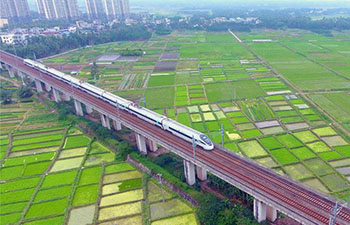
European Union Commissioner for enlargement and neighborhood policy Johannes Hahn speaks at a joint press conference with Serbian President Aleksandar Vucic (not in the picture) in Belgrade, Serbia, on Feb. 7. 2018. Aleksandar Vucic and Johannes Hahn on Wednesday discussed the key challenges for Serbia on its path towards full EU membership. (Xinhua/Predrag Milosavljevic)
BELGRADE, Feb. 7 (Xinhua) -- Serbian President Aleksandar Vucic and European Union Commissioner for enlargement and neighborhood policy Johannes Hahn on Wednesday discussed the key challenges for Serbia on its path towards full EU membership.
The duo agreed that relations with Kosovo, border disputes with Croatia and Bosnia and Herzegovina (BiH), as well as harmonization of foreign policy with the European Union (EU) topped the list of outstanding issues.
Hahn arrived in Serbia for a two-day visit a day after the EU Commission adopted in Strasbourg the new enlargement strategy for the Western Balkans, which mentions Serbia and Montenegro as the next two countries that could join the EU by 2025 if they solve their bilateral disputes and implement reforms.
"EU accession must become the national goal of Serbia so that the people from different groups would accept that," Hahn said after his meeting with Vucic at a press conference, adding that Serbian people will see benefits from reforms in the rule of law, judiciary and other areas.
KOSOVO
Hahn said long-term stability demands reconciliation and good neighborhood relations, and repeated that the "EU does not wish to import bilateral disputes."
"Serbia needs to resolve and to implement a legally binding agreement with Kosovo, and we are here to help anyway we can, as well as in the case of other border disputes with Serbia's neighbors. Unsolved border disputes are not good for any country, and this is why Serbia needs to use this incentive, and this should be seen as something positive," he said.
He said that Serbia has among the toughest challenges of all regional countries. Chapter 35 of EU accession deals with the normalization of relations with its southern province Kosovo that unilaterally declared independence in 2008 that Serbia refutes.
Vucic stressed the solution will have to be a compromise in which "both sides will have to lose, and be satisfied only a little bit."
NEIGHBORHOOD RELATIONS
Other challenges, according to Vucic, include solving bilateral issues with neighboring Croatia and BiH around the demarcation of borders.
"We have to be responsible and to work hard, and we have to understand our difficult position. Our economic situation is not that difficult, but it can become difficult again if we do not solve political problems," he said.
Vucic commented that the harmonization of foreign policy will be a major political challenge and that it represents a pressure on Serbia because of its good relations with Russia.
However, he said that Serbia will be brave in proposing solutions for political problems that were left unsolved for decades, while citizens will be able to choose if they find these proposals acceptable, and if they wish to join EU or not.
Vucic maintained that the year 2025, set as the approximate time frame for Serbia's EU accession does not mean any guarantees, but that it is an important motivation for the citizens of Serbia, so that they acknowledge the progress that Serbia made in the past years.
During the first day of his visit to Serbia, Hahn also met Prime Minister Ana Brnabic, while on Thursday he will meet representatives of opposition parties, NGOs, and the media.
On Friday he will travel to Podgorica, capital of Montenegro.















